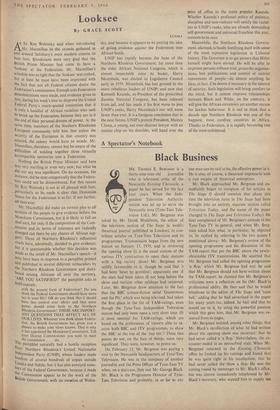Looksee
By GRACE SCOTT As Sir Roy Welensky said when introducing Mr. Macmillan to the crowds gathered in and around Salisbury's most modern cinema to hear him, Rhodesians were very glad that the British Prime Minister had come to have a looksee' at the Federation. Mr. Macmillan's schedule was so tight that the looksee' was rushed, but at least he must have been impressed with the fact that not all Federal citizens desire the Federation's continuance. Enough anti-Federation demonstrations were made, and evidence given to him, during his week's tour to disprove the United Federal Party's much-quoted contention that it is only a handful of African racialists who seek to break up the Federation, because they see in it the end of their personal dreams of power. At the same time members of the Southern Rhodesian European community told him that unless the security of the European in that country was assured, the colony would have to secede. Mr. Macmillan, therefore, cannot but be aware of the difficulties of welding together three virtually incompatible territories into a Federation.
Nothing the British Prime Minister said here was very startling or even very new; but what he did not say was significant. On no occasion, for instance, did he state categorically that the Federa- tion could not be dismembered. For this reason Sir Roy Welensky is not at all pleased with him; . particularly as he made it clear that Dominion Status for the Federation is as far, if not farther, off than ever.
Mr. Macmillan did make an earnest plea to all sections of the people to give evidence before the Monckton Commission, but it is likely to fall on deaf ears, for only if the composition of the Com- . mission and its terms of reference are radically changed can there be any chance of African sup- Port. Three of Northern Rhodesia's influential chiefs have, admittedly, decided to give evidence; but it is questionable whether this decision was made as the result of Mr. Macmillan's speech—it nlaY have been in response to a pamphlet printed and published in several different vernaculars by the Northern Rhodesia Government and distri- buted among Africans all over the territory. ARE YOU SATISFIED?' the pamphlet asks in bold capitals: with the present form of Federation? Do you think the Federal Government should have more say in your life? OR do you think that it should have less control over affairs and that more Power should come back to the Northern Rhodesia Government? THESE ARE IMPORT- ANT QUESTIONS THAT AFFECT ALL OF OUR LIVES. Whatever you think about Federa- tion, the British Government has given you a chance to make your views known. That is why it has appointed the Monckton Commission. Tell Your District Commissioner you want to meet the commission . . . etc. The pamphlet naturally had a hostile reception from Northern Rhodesia's United Nationalist Independent Party (UNIP), whose leaders made bonfires of several hundreds of copies outside .Lusaka and Ndola; but it has also annoyed mem- bers of the Federal Government, because it.made the Commission appear to be the work of the British Government, with no mention of Welen-
LUSAKA
sky, and because it appears to be putting the idea of giving evidence against the Federation into African heads.
UNIP has rapidly become the bane of the Northern Rhodesia Government; far more than the older African National Congress, which is almost respectable since its leader, Harry Nkumbula, was elected to Legislative Council early in 1959. Nkumbula has lost ground to the more rebellious leaders of UNIP; and now that Kenneth Kaunda, ex-President of the proscribed Zambia National Congress, has been released from jail, and has made it his first move to join UNIP's ranks, Harry Nkumbula's star will wane faster than ever. It is a foregone conclusion that in the near future, UNIP's preSent President, Mainza Chona, a young, not over-discreet lawyer with an outsize chip on his shoulder, will hand over the reins of office to the more popular Kaunda. Whether Kaunda's professed policy of patience, discipline and non-violence will satisfy the racial- ists in UNIP's ranks, who are already demanding self-government and universal franchise this year, remains to be seen.
Meanwhile, the Northern Rhodesia Govern- ment, alarmed, is busily fortifying itself with some of the most repressive legislation in Colonial history. The Governor is to get powers that Hitler himself might have envied. He will be able to imprison persons without trial, proscribe organisa- tions, ban publications and control or restrict movements of people—do almost anything he likes, in fact, if he deems it necessary in the interest of security. Such legislation will bring comfort to the timid, but it cannot improve relationships between Black and White; on the contrary, it will give the African extremists yet another excuse for lawless behaviour. It is sad to think that a decade ago Northern Rhodesia was one of the happiest, most carefree countries in Africa. Thanks to Federation, it is rapidly becoming one of the most embittered.










































 Previous page
Previous page